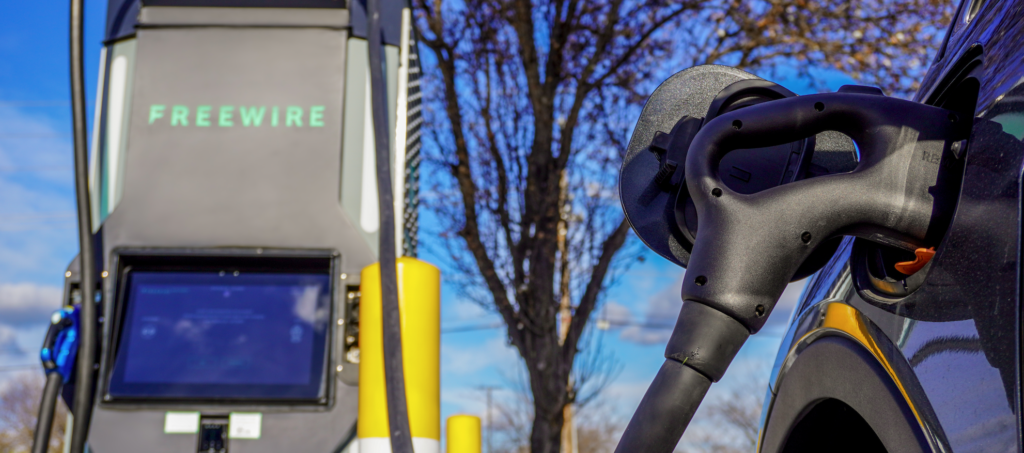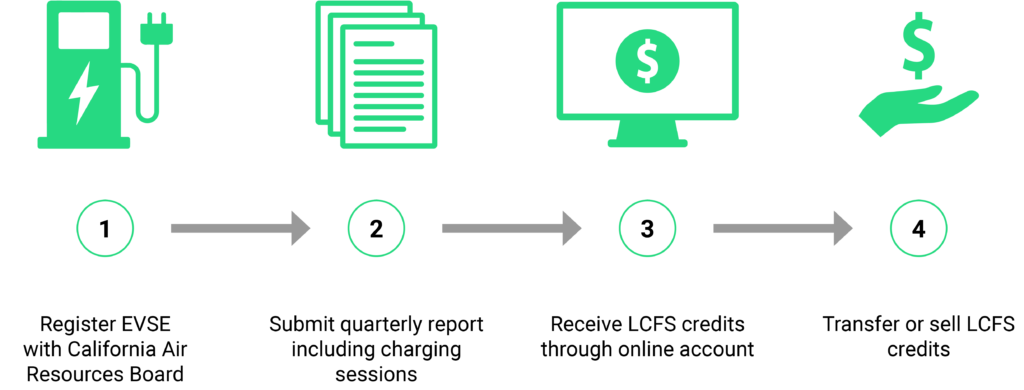Low Carbon Fuel Standard (LCFS) Credits Explained
Electric vehicle (EV) charging stations are eligible for LCFS credits in California— here’s how you can participate in the carbon market to offset project costs while reducing emissions.
Understanding the Carbon Market
Tackling climate change is one of the biggest challenges for this generation. American Airlines, Ford Motor Company, Apple, and bp are among the many companies that have recently announced net-zero greenhouse gas (GHG) emissions goals before 2050. Achieving net-zero can be accomplished by lowering total emissions within an organization’s operations and/or offsetting carbon-producing with carbon-reducing activity. Some energy operations, such as a coal power plant, produce more GHG emissions than they can directly offset with their activity, and, conversely, other energy operations, such as a wind power station, reduce more emissions than they produce. If the overall goal is reducing emissions, this dynamic of over-producers and over-reducers enables a market for emission transactions, commonly called a carbon market.
Multiple carbon markets are operating in different parts of the world. China has recently opened the world’s largest carbon market for power industries, eclipsing the European Union’s carbon market. One of the programs designed to reduce GHG emissions in California is called the Low Carbon Fuel Standard (LCFS).
What are LCFS Credits?
The LCFS aims to reduce emissions in the transportation sector by limiting the carbon intensity (CI) of fuels used. The LCFS program is administered by the California Air Resources Board (CARB), which sets targets for the CI of fuels used in the state. Fuels like petroleum are high CI fuels, whereas compressed natural gas, biogas, hydrogen, and electricity used for electric vehicles (EVs) are low CI fuels.
In the LCFS market, low CI fuel producers can register to produce LCFS credits for the amount of fuel dispensed. High CI fuel producers or distributors then purchase those credits to offset the amount of high CI fuel dispensed in their portfolio. The price paid for LCFS credits varies with supply and demand, the amount of low CI fuels generating credits vs. the amount of high CI fuels consuming those credits.
How to Participate in the LCFS Market
Owners and operators of electric vehicle charging equipment (EVSE) can participate in the LCFS market and generate LCFS credits for providing EV charging services. These credits can contribute meaningfully to the ROI of installing EVSE at your place of business. Recognizing the current need to accelerate EV charging infrastructure, in some cases, CARB allows LCFS credits to be generated not just for EV charging activity but also for installing EVSE capacity at the location. This allows LCFS to provide incentive to install EVSE regardless of utilization while EV adoption increases.
Steps to register and receive LCFS credits
LCFS credits for EV charging stations are determined by the amount of energy provided to vehicles. Prices for LCFS credits fluctuate with the demand for credits. The average price from 2018-2020 ranged from $150-$200 per credit. The average price in January 2021 was $199 per credit1. This can be a meaningful source of revenue at high utilization sites as demonstrated in the table below. This revenue can be even higher if the equipment qualifies for a capacity credit.
| Electric vehicles charged per day2 | Estimated LCFS revenue per year3 |
|---|---|
| 1 | $1,500 |
| 5 | $7,700 |
| 8 | $12,300 |
| 10 | $15,400 |
Estimated LCFS revenue by number of EVs charged per station per day
This administrative process of registering with CARB, reporting on activity, and trading credits in the LCFS market may be daunting for most business owners. There are multiple service providers who can handle this for you. Check with a FreeWire representative or your network or EVSE provider to see how to ensure that you are getting the full benefit of the LCFS credits you could generate.
For additional information on LCFS credits or incentives available in your area, contact a FreeWire energy specialist today.
1 Source: California Air Resources Board Data Dashboard: https://ww3.arb.ca.gov/fuels/lcfs/dashboard/dashboard.htm
2 Assumes average credit price of $200. Assumes charge per vehicle of 25kWh or approx 100 miles of range on DCFC.
3 Assumes equipment is eligible for credits for charging cars only, does not assume capacity credit.


